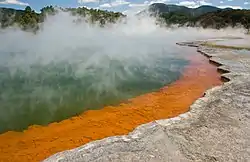Waiotapu
Waiotapu, also spelt Wai-O-Tapu (Māori for "sacred waters") is an active geothermal area at the southern end of the Okataina Volcanic Centre, just north of the Reporoa caldera, in New Zealand's Taupo Volcanic Zone. It is 27 kilometres south of Rotorua.[1] Due to dramatic geothermal conditions beneath the earth, the area has many hot springs noted for their colourful appearance, in addition to the Lady Knox Geyser, Champagne Pool, Artist's Palette, Primrose Terrace and boiling mud pools.[2] These can mostly be viewed through access by foot, and in addition to a paid and curated experience, naturally forming hot springs appear around the area. The geothermal area covers 18 square kilometres.[1] Prior to European occupation the area was the homeland of the Ngati Whaoa tribe who descended from those on the Arawa waka (canoe).
The area has a long history as a tourist attraction. While the area has been protected as a scenic reserve[3] since 1931, a tourist operation occupies part of the reserve under a concession. It operates under the name "Wai-O-Tapu Thermal Wonderland".[4] The business was bought in 2012 by Te Arawa Group Holdings, a local Maori tribal business, from the Sewell/Leinhardt family, who had run it for 30 years.[5]
At Wai-O-Tapu the New Zealand State Highway 38 begins. It crosses Kaingaroa Forest, passes Murupara, and then continues as an unsealed road through the mountains of Te Urewera, along Lake Waikaremoana to Wairoa on the border of Hawke Bay.
Gallery
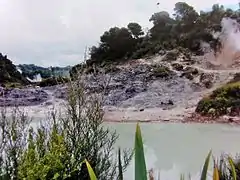
Echo Lake Waiotapu.- 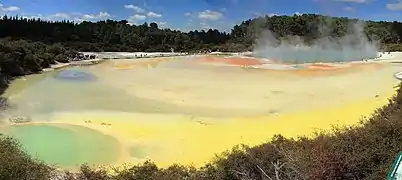
Central Pools of Wai-o-Tapu. .jpg.webp)
Lake Ngakoro Waterfall Waiotapu.- 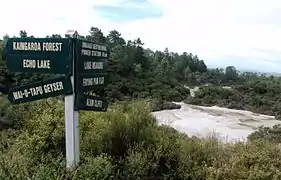
Lake Ngakoro Waiotapu.- 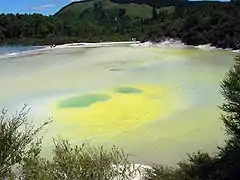
Artist's Palette  Lady Knox Geyser erupting
Lady Knox Geyser erupting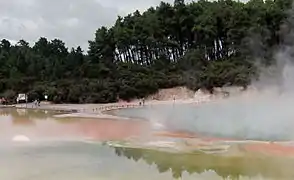
Waiotapu Artist's Palette 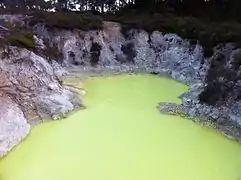
Water pond made yellow by sulfur
References
- "Waiotapu Thermal track". Department of Conservation. Retrieved 27 December 2012.
- "Guide to New Zealand Geothermal Attractions at Waiotapu". USAVE. Retrieved 13 May 2015.
- "Waiotapu". Waikato Regional Council. Retrieved 27 December 2012.
- "Waiotapu Thermal Wonderland, New Zealands most colourful geothermal area". waiotapu.co.nz. Retrieved 4 February 2014.
- Macfarlane, Kristin (3 November 2012). "Te Arawa buys major thermal tourism park". The Daily Post. Retrieved 27 December 2012.
External links
| Wikimedia Commons has media related to Waiotapu. |
